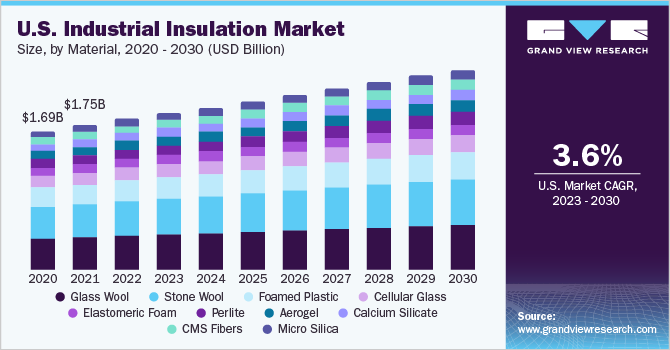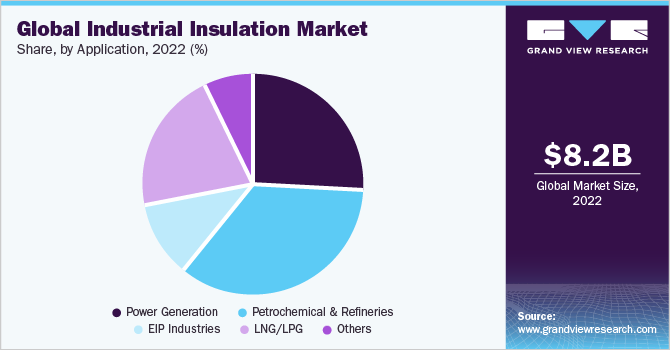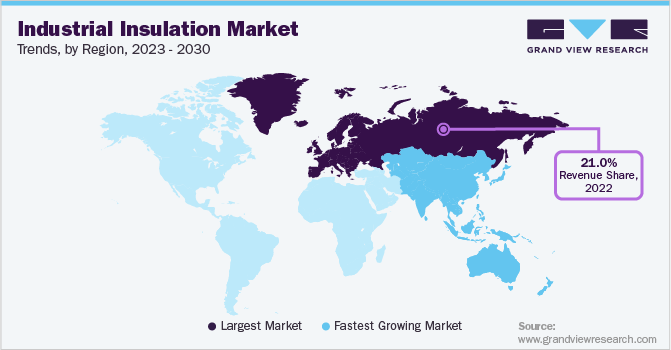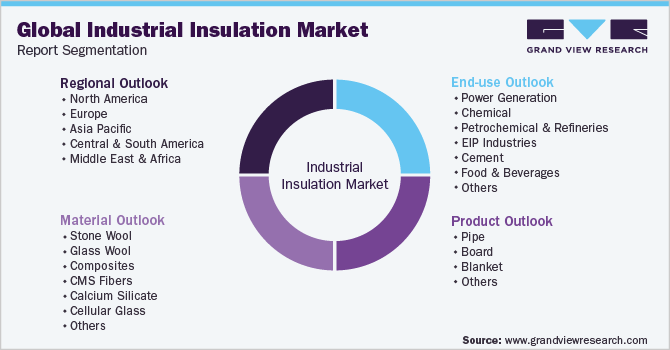- Home
- »
- Advanced Interior Materials
- »
-
Industrial Insulation Market Size, Share, Trends Report, 2030GVR Report cover
![Industrial Insulation Market Size Report By Material, (Stone Wool, Glass Wool, Foamed Plastic), By Product, By Application (Power Generation, EIP), By Region, And Segment Forecasts, 2023 - 2030Report]()
Industrial Insulation Market Size Report By Material, (Stone Wool, Glass Wool, Foamed Plastic), By Product, By Application (Power Generation, EIP), By Region, And Segment Forecasts, 2023 - 2030
- Report ID: GVR-1-68038-550-2
- Number of Report Pages: 90
- Format: PDF, Horizon Databook
- Historical Range: 2018 - 2021
- Forecast Period: 2023 - 2030
- Industry: Advanced Materials
Industrial Insulation Market Size & Trends
The global industrial insulation market size was valued at USD 8.21 billion in 2022 and is expected to grow at a compound annual growth rate (CAGR) of 5.0% from 2023 to 2030. Increasing product demand for boosting process efficiency, condensation control, noise reduction, freeze protection, and for reducing environmental pollution is expected to drive market growth over the forecast period. In addition, the rising awareness regarding the benefits of insulation in the industrial application and its related costs is expected to drive the market for industrial insulation in North America.

The market witnessed a severe downfall in the investments in the industrial sector owing to the pandemic, thereby impacting the market. In addition, dramatic fall in crude oil prices led to a drop in fiscal resources for oil-producing countries, which affected the product demand from oil & gas sector.
The market in the U.S. is expected to witness increased demand for insulation for industrial applications, such as, machinery, boilers, pipes, and storage tanks, and in linings of heat exchangers, cooling towers, and ventilation & air conditioning systems, among others. The demand outlook for the U.S. is favorable, with private investments in the industrial sector reaching the highest levels in 2018. The industrial sector is predicted to witness significant expansion owing to the rising GDP.
Many of the major manufacturers opt for independent distribution, in order to better serve their customers in case of customized products and to increase their profit margin. Manufacturers also establish a strategic relationship with distributors and provide solutions to the end-users through direct or third-party distribution.
The buyers in the market are essentially medium to large-scale businesses that exhibit limited sensitivity to the price of the product and lay higher emphasis on the product quality and the degree of insulation provided by the materials. In addition, key consumer industries have also exhibited a trend of adoption of the advanced products, which in turn is expected to drive the demand for niche product such as aerogel, perlite.
The market is exhibits high entry barriers, owing to the presence of large number of players. In addition, capital intensive nature of the market ensures the requirement of a substantial amount of time, planning, and resources for entry and sustenance. Achieving economies of scale remain a top priority in the market, which may discourage new market entrants.
Major industry participants are developing novel manufacturing processes for products in order to enhance its properties and make it suitable for several applications. Continuous investments in the R&D process by the companies for new product development and improvement in transparent technology for thermal insulation is expected to benefit the market.
Material Insights
Stone wool led the market and accounted for about 21.6% share of the revenue in 2022. Stone wool is manufactured from volcanic rocks such as dolomite, diabase, and basalt, which are available in abundance. Stone wool products are generally used where high compressive strength is required. It acts as an excellent fire barrier and does not emit any dangerous amount of smoke or toxic gases. It also provides effective protection against both high and low temperatures.
CMS fibers are expected to expand at a CAGR of 3.9% during the forecast period, owing to the increasing demand for high-temperature insulation for fire protection in industrial applications. The product offers an exceptional performance-to-weight ratio and resistance to chemical attacks, which is expected to boost its demand.
Calcium silicate is anticipated to witness a higher demand, owing to its preference as an alternative to asbestos for high temperature insulation, since it acts as an excellent barrier to infrared radiation. High temperature piping and industrial-grade equipment are the common applications of calcium silicate.
Elastomeric foam is estimated to reach USD 621.8 million by 2030 owing to its superior moisture barrier properties as compared to other materials. Elastomeric foam products exceptional dimensional stability. In addition, they offer excellent protection against condensation, thermal loss, and south transfer. They are considered environmentally friendly product and cost-effective alternative to other expensive insulation materials. It is considered as an ideal solution for plastic piping insulation.
Product Insights
Pipe insulation led the market and accounted for about 47.76% share of the revenue in 2022. The market is projected to witness notable demand, expanding at a CAGR 5.5% from 2023 to 2030 due to its superior performance and ability to stabilize the process temperatures. It provides protection against freeze damage and pipe breaks and prevents exposure to extreme temperatures. The product aids in increasing the energy efficiency of the process or plant, thereby reducing the operating expenses. In addition, pipe insulation is also used for heat conservation, fireproofing, and soundproofing.
The thickness of these insulations differ depending upon the material used and application. Blanket insulation products are specifically used in high temperature applications, operating up to 538ºC. Typical applications include heat exchanger, storage tanks, stack installations, cooling towers, air conditioning ductwork, and large diameter piping, among others. Removable blankets are used where installation of conventional insulation is difficult; hence reduce the labor costs associated with installation.
Industrial board stood at USD 1,288.8 kilotons in 2022, owing to excellent thermal performance from ambient to high temperatures for mechanical, power, and process systems. Mineral wool board is widely used for number of applications; owing to the low shrinkage it exhibits at high temperature, in order to prevent the formation of gaps at joints to prevent thermal leaks.
Spray foam and milled fiber are also used for industrial insulation applications. Spray foam is a sealant, designed to seal cracks, seams, and smaller gaps and to eliminate drafts, block insects, and repel moisture. These are also used to fill, insulate, and seal corner joints, exterior cracks, utility panels, pipes, and duct penetrations.
Application Insights
LPG/LNG led the market and accounted for about 20.70% share of the revenue in 2022. The market is expected to continue the trend over the forecast period, which can be attributed to high risk involved in the transportation & storage of LPG & LNG products, leading to extensive product demand. In addition, the proper insulation of the transportation pipes in the LNG and LPG industries also results in a heightened demand for insulation, which leads to market growth.
Power generation industry is expected to witness a heightened demand for these products, owing to its ability to minimize power losses. Growing concerns regarding the energy management among the power generation industry across the globe is expected to drive the market growth over the forecast period.

Petrochemical & refineries industry is expected to experience a robust growth, expanding at a CAGR of 4.8% over the projected period. The oil & gas industry is involved in the continuous high volume production of crude oil and natural gas, which is estimated to result into higher demand for the products.
The EIP industries are involved in the production of a wide range of products that require the insulation for thermal energy conservation. In addition, growth of the manufacturing sector coupled with the presence of stringent regulatory norms by the European Commission and other governing agencies is expected to drive the market growth in the forecast period.
Regional Insights
Europe dominated the market and accounted for about of 21.0% share of the revenue share in 2022. The market is predicted to remain the major market by 2030. Strict codes and laws effectuated by the European regulatory authorities have increased the awareness about rising energy costs and the need for energy efficiency, which is expected to benefit the market. The market in Europe is focused on achieving significant energy saving and emissions mitigation potential related to improved thermal insulation in EU27 industry which is expected to play a key role in wider application of industrial insulation products in various end-use industries.
North America has been dominating the global industrial insulation market over the years, owing to highly developed industrial and power generation sector influencing the demand. U.S. holds the largest market share in the market, which can be attributed to its extremely advanced industrial sector, which accounts for the largest energy consumption in the region.

The market in the U.S. is expected to reach USD 2.42 billion by 2030 due to rising awareness regarding the products, coupled with industrial developments. However, extremely fast-paced growth in industrial sector in Asia Pacific, especially in China, India may limit the expansion in the U.S., which may hamper the market growth.
Asia Pacific is expected to generate notable growth on account of rising oil production in the economies of China and India. The industry is also expected to exhibit high growth due to the growing thermal energy production, leading to extensive need of insulation in order to maximize efficiency. In addition, the market in Asia Pacific is expected to generate notable growth on account of rising oil production in the economies of China and India.
Key Companies & Market Share Insights
The industry players are focused on increasing their market share through organic growth, rather than mergers and acquisitions. Companies in the market are focusing on expanding their product portfolio by developing cost-effective insulation products with enhanced properties. Manufacturers are also focusing on expanding their manufacturing capabilities in order to cater to the ascending product demand.
Large players, like Armacell have focused on international strategy, through which the company acquired Polipex Industria e Comercio Ltda, a Brazilian manufacturer of extruded polyethylene insulation products for technical equipment. The company also established a joint venture with JIOS Aerogel, South Korea to develop & manufacture high-tech silica aerogel blankets. Some prominent players in the global industrial insulation market include:
-
Rockwool Insulation A/S
-
Poroc Group Oy
-
Knauf Insulation
-
TechnoNICOL Corporation
-
Anco Products, Inc.
-
Aspen Aerogels, Inc.
-
Cabot Corporation
-
Morgan Advanced Materials plc
-
Unifrax LLC
-
RATH Group
-
IBIDEN Co., Ltd.
-
Armacell International
Industrial Insulation Market Report Scope
Report Attribute
Details
Market size value in 2023
USD 8.61 billion
Revenue forecast in 2030
USD 12.10 billion
Growth rate
CAGR of 5.0% from 2023 to 2030
Base year for estimation
2022
Historical data
2018 - 2021
Forecast period
2023 - 2030
Quantitative units
Volume in kilotons, revenue in USD billion and CAGR from 2023 to 2030
Report coverage
Volume forecast, revenue forecast, competitive landscape, growth factors, and trends
Segments covered
Product, application, material, region
Regional scope
North America; Europe; Asia Pacific; Central & South America; Middle East & Africa
Country scope
U.S.; Canada; Mexico; U.K.; Germany; France; Italy; Spain; Poland; Benelux; Nordic; CIS; China; India; Japan; South Korea; Indonesia; Malaysia; Thailand; Vietnam; Brazil; Argentina; Colombia; GCC; Turkey
Key companies profiled
Rockwool Insulation A/S; Paroc Group Oy; Knauf Insulation; TechnoNICOL Corporation; NICHIAS Corporation; Anco Products, Inc.; Aspen aerogels, Inc.; Cabot Corporation; Morgan Advanced Materials plc; Unifrax LLC; RATH Group; IBIDEN CO., LTD.; Armacell International Holding GmbH; L'ISOLANTE K-FLEX S.p.A.; NMC Insulation; Kaimann; Pittsburgh Corning Europe N.V.; GLAPOR Werk Mitterteich; Duna-Corradini S.p.A.; Polyguard Products, Inc.; Owens Corning; Johns Manville; Rockwool Manufacturing Company; Saint Gobain S.A.; American Rockwool Manufacturing LLC
Customization scope
Free report customization (equivalent up to 8 analysts working days) with purchase. Addition or alteration to country, regional & segment scope.
Pricing and purchase options
Avail customized purchase options to meet your exact research needs. Explore purchase options
Global Industrial Insulation Market Report Segmentation
This report forecasts revenue growth at global, regional & country levels and provides an analysis on the industry trends in each of the sub-segments from 2018 to 2030. For this study, Grand View Research has segmented the global industrial insulation market on the basis of material, product, application, and region:

-
Material Outlook (Volume, Kilotons; Revenue, USD Billion; 2018 - 2030)
-
Stone Wool
-
Elastomeric Foam
-
Micro Silica
-
Glass Wool
-
Composites
-
CMS Fibers
-
Calcium Silicate
-
Cellular Glass
-
Foamed Plastic
-
Perlite
-
Aerogel
-
Cellulose
-
Others
-
-
Product Outlook (Volume, Kilotons; Revenue, USD Billion; 2018 - 2030)
-
Pipe
-
Board
-
Blanket
-
Others
-
-
Application Type Outlook (Volume, Kilotons; Revenue, USD Billion; 2018 - 2030)
-
Power Generation
-
Petrochemical & Refineries
-
EIP Industries
-
LNG/LPG
-
Others
-
-
Regional Outlook (Volume, Kilotons; Revenue; USD Billion; 2018 - 2030)
-
North America
-
U.S.
-
Canada
-
Mexico
-
-
Europe
-
Germany
-
U.K.
-
France
-
Poland
-
Spain
-
Italy
-
Benelux
-
Nordic
-
CIS
-
-
Asia Pacific
-
China
-
India
-
Japan
-
South Korea
-
Indonesia
-
Malaysia
-
Thailand
-
Vietnam
-
-
Central & South America
-
Brazil
-
Argentina
-
Colombia
-
-
Middle East & Africa
-
GCC
-
Turkey
-
-
Frequently Asked Questions About This Report
b. The global industrial insulation market size was estimated at USD 8.21 billion in 2022 and is expected to reach USD 8.61 billion in 2023.
b. The global industrial insulation market is expected to grow at a compound annual growth rate a CAGR of 5.0% from 2023 to 2030 to reach USD 12.10 billion by 2030.
b. Europe dominated the industrial insulation market with a share of 21.0% in 2022. This is attributable to the rapidly increasing number of construction and infrastructural activities coupled with the rising installation of district energy systems in economies such as Germany, UK, Spain, and others.
b. Some key players operating in the industrial insulation market include Rockwool Insulation A/S, Paroc Group Oy, Knauf Insulation, TechnoNICOL Corporation, NICHIAS Corporation, Anco Products, Inc., Aspen aerogels, Inc., Cabot Corporation, Morgan Advanced Materials plc, Unifrax LLC, RATH Group, IBIDEN CO., LTD., Armacell International Holding GmbH, L'ISOLANTE K-FLEX S.p.A., NMC Insulation, Kaimann, Pittsburgh Corning Europe N.V., GLAPOR Werk Mitterteich, Duna-Corradini S.p.A., Polyguard Products, Inc., Owens Corning, and others
b. Key factors that are driving the market growth include increasing product demand for boosting the process efficiency, condensation control, noise reduction, freeze protection, and for reducing environmental pollution.
Share this report with your colleague or friend.
![gvr icn]()
NEED A CUSTOM REPORT?
We can customize every report - free of charge - including purchasing stand-alone sections or country-level reports, as well as offer affordable discounts for start-ups & universities. Contact us now
![Certified Icon]()
We are GDPR and CCPA compliant! Your transaction & personal information is safe and secure. For more details, please read our privacy policy.
We are committed towards customer satisfaction, and quality service.
"The quality of research they have done for us has been excellent."





